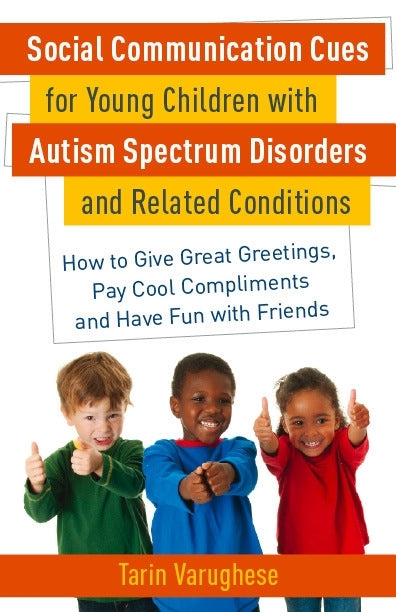
Press Reviews
Afasic News
This is a book |'d love to have had twenty years ago, when speech and language therapy appeared to have given up on my daughter and I was desperately searching for any ideas that might help her.
Nicole Mank, Marriage and Family Therapist and parent of a child with Sensory Processing Disorder, California
Using the activities described by author Tarin Varughese, children on the autistic spectrum will benefit from direct teaching in small groups. The book has checklists for social skills to ensure that each child's key deficits are correctly identified... I recommend this book to all parents, students and teachers who have concerns about social skills development. There are also many excellent tips for observation activities.' Montessori International, Wendy Fidler 'As both a parent and a professional I have found this approach to be incredibly useful in breaking down the complexity of social exchanges. We often struggle for the right language to convey the unwritten rules of engagement. This program gives us the 'map' and consequently the confidence to help our children. I'm encouraged by the progress I have witnessed!
Michelle Harr, Speech-Language Pathologist, Michigan
An in-depth look at social communication broken down into simplistic step-by-step instruction. While working with children/young adults presenting with pragmatic language disorder, I have found that Varughese's program offers a hierarchical approach to pragmatic coaching and lends itself to be useful for increasing the understanding and use of pragmatic language at any age.
Jennie Kaufman Singer, Ph.D., Licensed Clinical Psychologist and Assistant Professor, Sacramento State University, California
As a clinician, I found Social Communication Cues for Young Children with Autism Spectrum Disorders and Related Conditions to be an incredibly useful hands-on guide for working as a social coach with children of all ages. As a parent of a child with social delays, I found it to be a blueprint for daily exercises and vocabulary that I could use at home and share with teachers. [This book] is a must-read for anyone who wants social skill-building tools at their fingertips.
NASEN Special Magazine
It is divided into seven easy to dip into sections - initiating social interaction, maintaining social interaction, body positioning, perspective taking, visual modality, emotional regulation and developing humour. For each skill she gives between five and ten rules, for instance "a child needs to learn to initiate asking for help", "children need to develop the ability to think about the likes and dislikes of others". The reason for each rule is explained concisely, and suggestions given for the words for teachers and SENCos to use, along with helpful tips.
NAPLIC Matters
This is an interesting and potentially useful book.
Emma Baldwin, Speech and Language Therapist, Avon.
The book is written clearly and succinctly in easy to read style... the book provides practical suggestions for areas of social and emotional wellbeing that are frequently forgotten. Although the book describes the importance of working on these areas for children on the Autism spectrum the ideas could apply to any child with emotional/behavioural or language difficulties.
